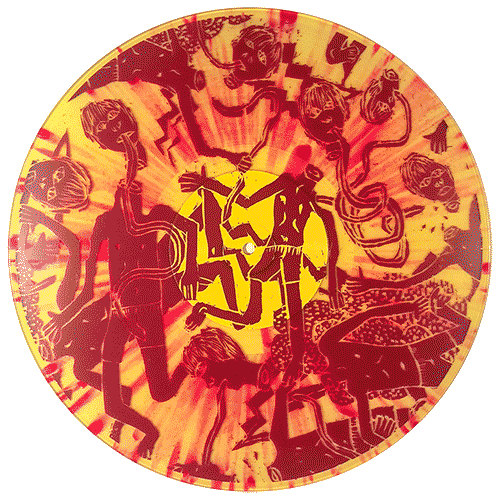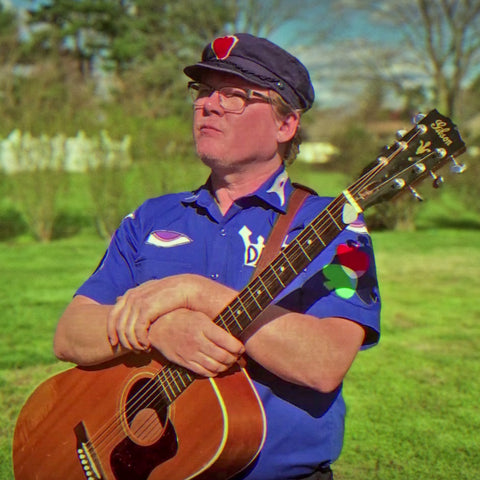$ 18.00 USD
SOLD OUT
- Snap Outtavit
- Dry Goods Dry Power
- Pendulum Mania
- On Purpose
- Who Hears Twell Van Dunder
The most apt description of Daniel Smith’s sojourn as a musician would be written in iambic pentameter, because this sojourn is as immemorial as The Pilgrim’s Progress, or Paradise Regained, the son raised in a proper spiritual and musical household, who casts it all off, goes out and listens to a bunch of Syd Barrett and Don Van Vliet and similarly admirable material, is recast in the image of this highly original music, and who then returns to the fold, like in the parables. Nearer to the home fires, he is repurposed and begins to hear the profundity in the familial gospel sound, whereupon he conceives of this band, to be made up of his siblings and friends, which will reproduce this very sound of family, and his band records several albums of truly unique contemporary music, more punk than punk, more psychedelic than psychedelia, and more ecstatic and divinely inspired than a lot of the slick gospel music; he thus falls somewhere between the cracks, like a lot of truly revolutionary American composers, like Charles Ives, like Moondog, like Harry Partch, like Meredith Monk, like Sun Ra. From this singular perch, Smith composes some of the most original music of the nineties and oughts, with his siblings by his side, often wearing inventive homemade costumes spun from the metaphors of the Daniel Smith cosmogony.
A melancholy, not unforeseeable thing happened on the way to the Danielson Famile albums, however, and that is that Daniel’s siblings grew up. And as with many a band that succumbs to marriage and children and the lure of a more steady income, the Danielson Famile became more difficult to assemble for tours and such. Their apex was the astounding Fetch the Compass Kids, from 2001, after which Smith became Danielson and began to record in more conceptually flexible ways, with a wider range of collaborators, including, on Ships, the excellent Deerhoof, and in this way he proceeded like the pilgrim of Bunyan’s poem down a narrowing and serpentine path of enlightenment and wisdom that one inevitably associates with, as Dante says, the middle of a life’s journey.
After one more solo album and an excellent collaboration with Jad Fair (of Half Japanese), Snap Outtavit EP, the newly released EP by Danielson we have before us, finds Daniel Smith largely making music with his family again, with sisters Megan (bells, vox) and Rachel (keys, vox) , and brothers Andrew and David (drums), with his wife Elin (vox), not to mention a bunch of kids of the various Smiths (vox). Likewise, the album is recorded with early champion Kramer, who helped mix and also played bass and keys on a couple of tracks. Snap Outtavit, then, while it is the work of an older, wiser prophet of these complex times, thus returns us to the familiar family atmosphere, the family mystery at the heart of the very greatest Danielson work.
As with the early Danielson records, the verses here are often chromatic, and the rhythms are often exceedingly slippery, and there are modulations. If you didn’t know better, you might even say the Danielson songs are a bit progressive, with canny and exceedingly sophisticated arrangements, but just when they appear to be musically demanding (though entirely in reach for a Smith family ensemble that has come to be able to play anything), the songs give way to big beautiful hooks (often in the choruses), repetitions that are often sung by massive ensembles of Smiths, sometimes in counterpoint, antiphons of Smiths, and with the ecstatic and prophetic quality that such hooks should entail, even as Smith’s lyrics have become more allusive and less patently gospel-oriented, with the result that they are even more powerful, emblematic, and persuasive.
The Famile has come from all over now, from across New Jersey, and from deepest Pennsylvania, to unite in this purpose again, and the lyrics reflect this—the lyrics are the evocation of this—both of the solitary path, the pilgrim’s progress that Daniel Smith is on, to the beauty, power, and whimsical grace of his family playing with him. On the luminous “On Purpose,” for example, has minimalist inclinations (in the prologue, where a very simple organ chord plays, while the singers intone “What do you know?” for a solid minute and a half), after which some verses give way to an out-chorus, an arresting and earwormable melody, “It’s getting hot in here, but you are so patient, dear,” lasting for more than two minutes. “On Purpose” is like no pop song you’ve heard recently, with the groove being held down primarily by the marimba, and it could take you several dozen listens to figure which is the gospel message concealed in the repeated line: “It’s all on purpose now.”
An allegory, this recording? Like in ecstatic religious poetry of another time, the new Danielson songs, on this EP, tackle the spiritual struggles of the everyday— growing older, having kids, momentarily losing hope, for which the route to salvation is music itself, the playing, the singing, the writing of music, and the listening to it as well. Daniel Smith invites you and yours onto the sojourn with him.
--Rick Moody












